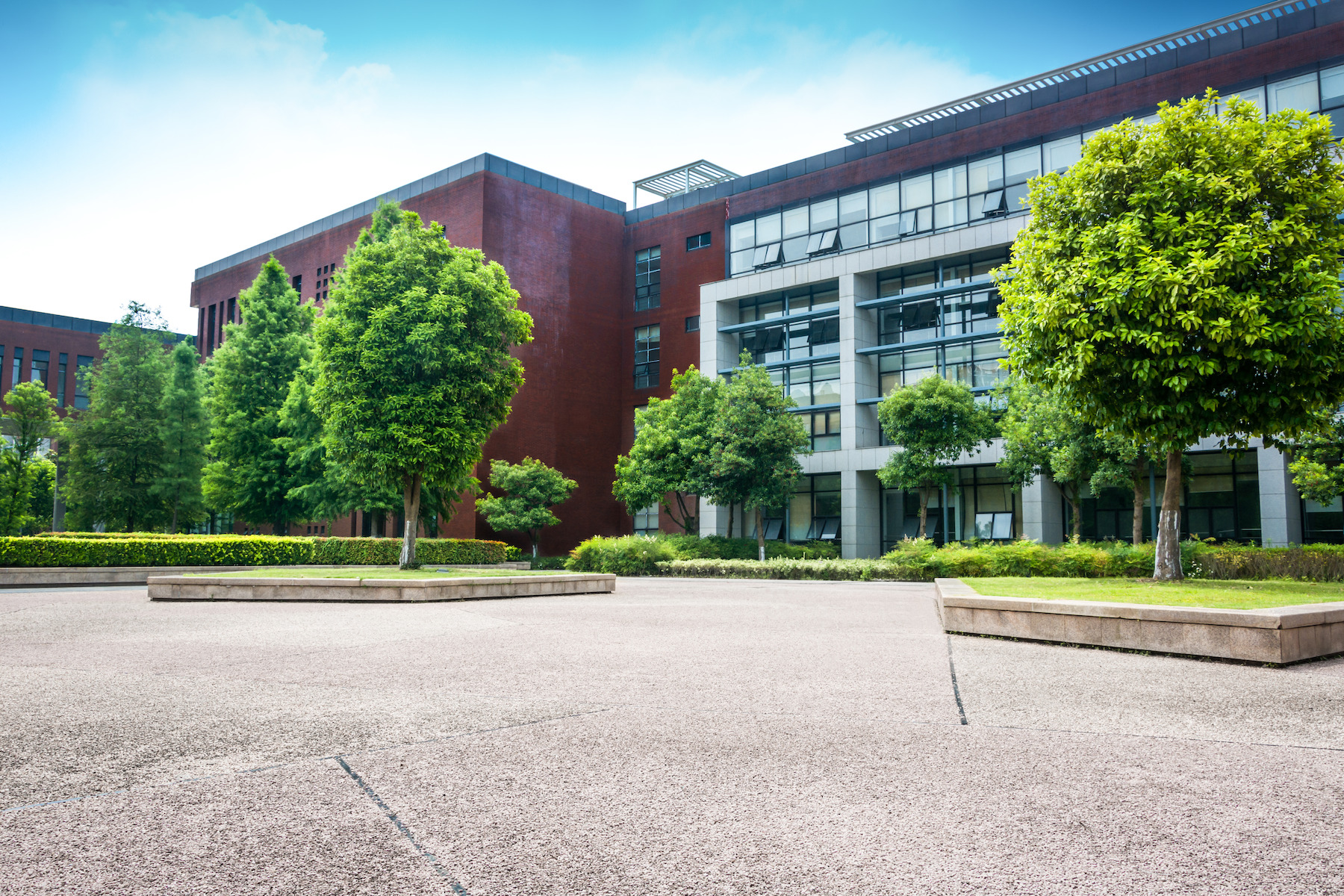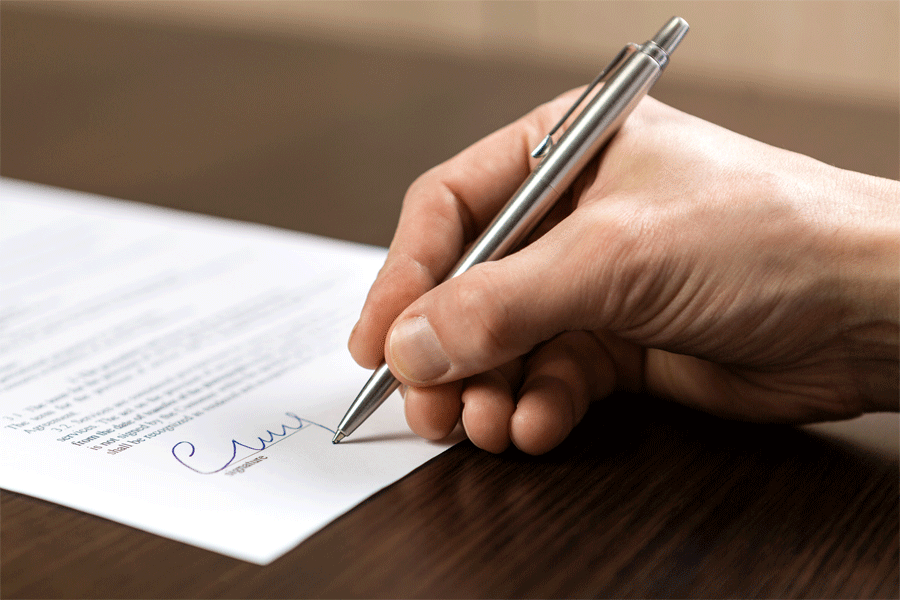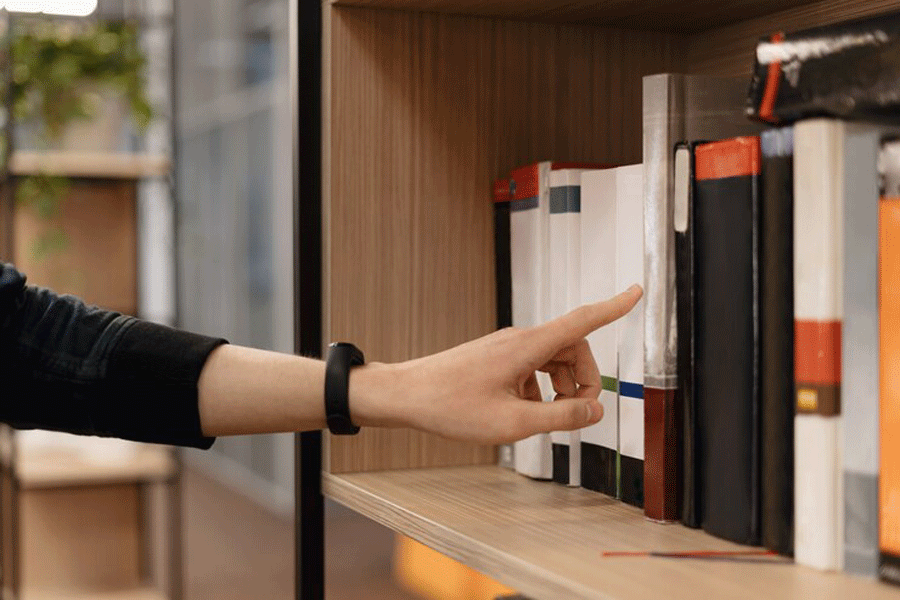It is a formal letter written to a librarian or chief librarian to request permission to access their library to further a particular cause. This permission letter is usually written by individuals who want to borrow books from the library to use them for references etc, or to have guest access to library collections.
Whether you are a student, researcher, or any individual interested in using a library, you must seek permission from the head librarian or any other relevant person before borrowing or using any books or documents in the library. The key purpose of drafting such a letter is to establish a formal agreement between you and the party that authorizes the use of the library. The letter also establishes your right to use the library materials and ensures that you abide by the stipulated library rules, policies, and procedures.
This article will discuss the standard format for writing an effective permission letter to use a library and what to include in it. The article also includes free sample letters and several downloadable and editable templates that you can use for reference when drafting your letter.
Free Templates
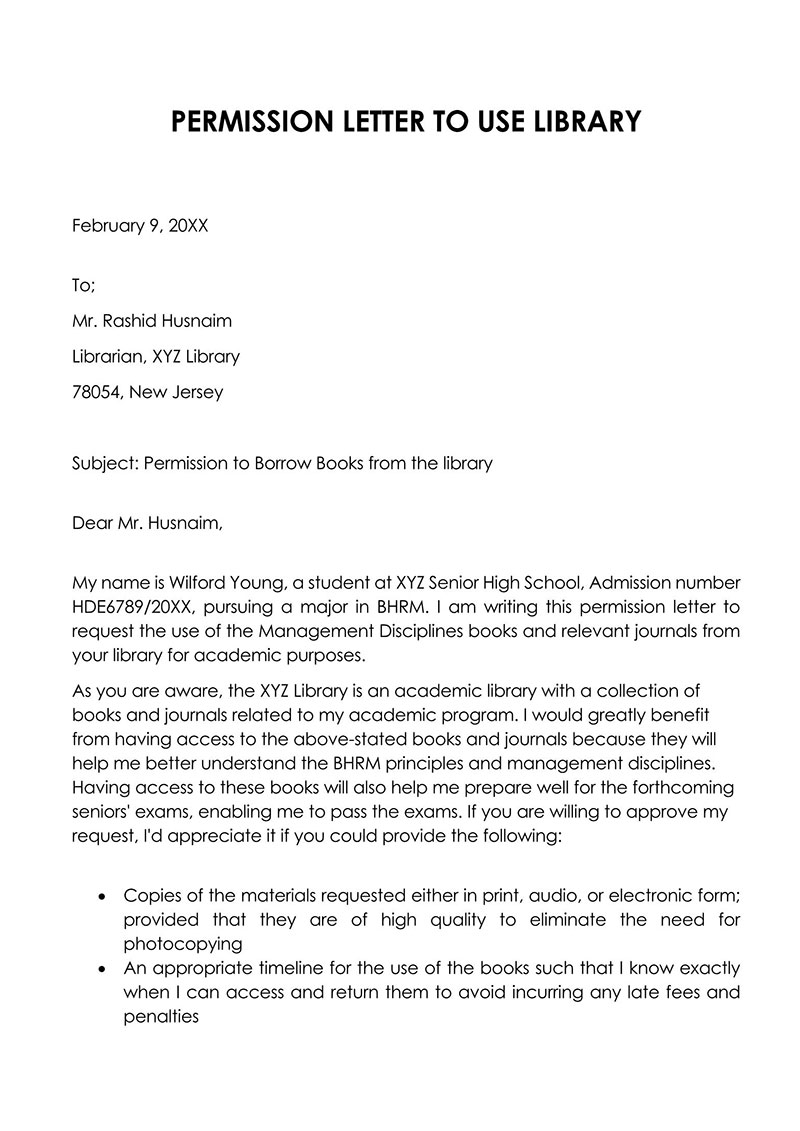
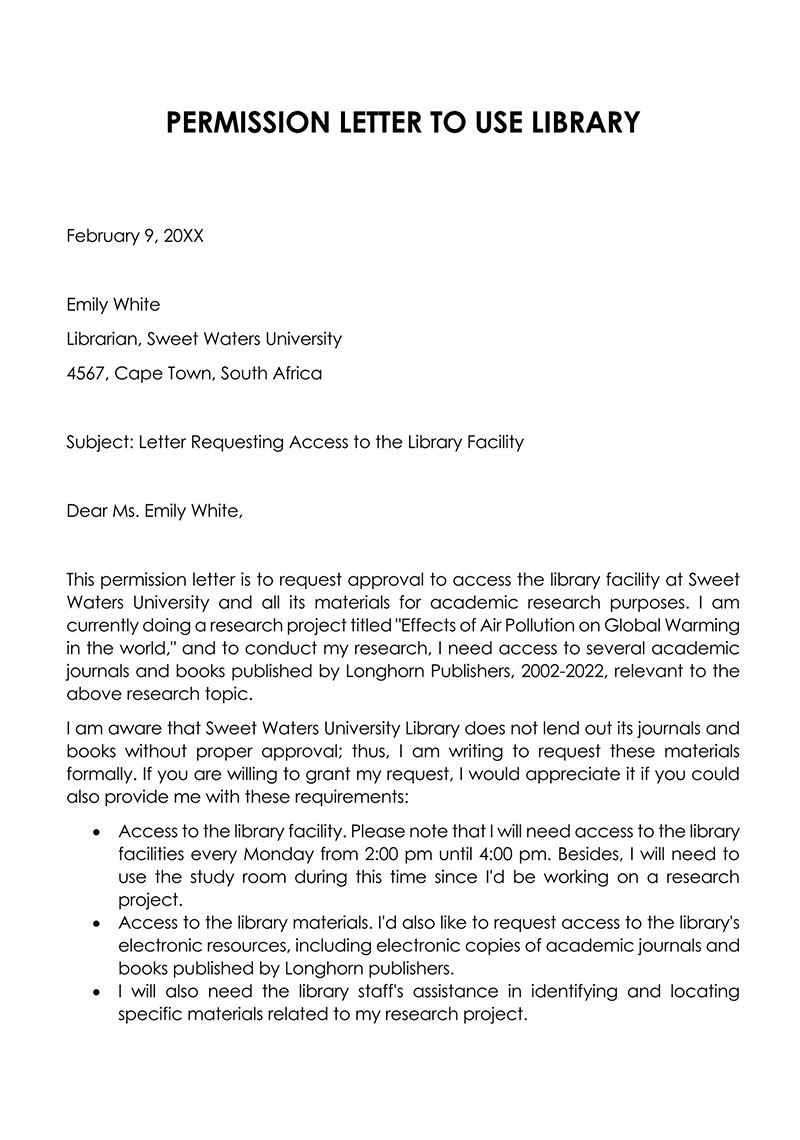
How to Format a Permission Letter to Use Library
The letter should be written in an official tone while also being personal and appealing. While drafting the letter, the appropriate format to follow is the standard business letter format. The right font type to use is either Times New Roman, Arial black, or Calibri body. The text’s font size should not be less than 10 points and not more than 12 points.
The following is the general format for writing a letter seeking permission to use a particular library for study or research purposes:
The header part is the first and most essential element of any business letter. Typically, this includes the sender’s name, contact information, address, and the date of writing the letter. Nevertheless, sometimes it is possible to write the letter that does not include the sender’s address, but the date and the recipient information must be provided in the letter.
Subject line
It is important to start your letter with a clear and concise subject line that promptly lets the recipient know its purpose. The subject line should not be more than six words long.
Salutation
The next element to include is a professional salutation to demonstrate your respect for the authority. Ideally, a letter written to request access to a library should be addressed to the librarian or the chief librarian. Consider including the recipient’s correct name and title to make the letter seem more personalized to the reader. However, if you do not know their name, use a generalized salutation such as “Dear Librarian” or the custom “Dear Sir/Madam salutation.”
Introduction
Use the introductory paragraph to briefly introduce yourself, the college or organization that you represent, and explain why you want to use the library. Make sure to mention the specific library you want to use and its location if possible—additionally, state whether you are seeking permission for personal or official use of the library.
Body
The body of the letter is the main section where you provide a detailed explanation of your reasons for writing it. This should be written in at least 2-3 paragraphs, and it should be written in a polite and professional tone. Typically, the first body paragraph should discuss your need to access the library. The second body paragraph highlights the specific time frame you will be using the library for and your requirements, and the last paragraph includes an appreciation line for the librarian for considering your request.
Conclusion
You can end the letter by restating its purpose and providing a quick summary of the key points discussed throughout the letter and include a call-to-action statement. Finally, provide an appropriate sign-off such as “sincerely, yours truly, regards,” and your signature and personal information. However, providing your personal information underneath your signature is only essential if you have not included the sender’s address in the header of the letter.
Essential Components to Add to a Permission Letter
When writing a letter seeking approval to use a library, there are certain details that you must incorporate in the letter to make it more effective in achieving your purpose.
These include the following:
Explain your reason(s) for using the library
Before any librarian can give you access to their library, they will first need to understand why you need access to the library and decide whether your reasons are valid or not. Therefore, you should make sure to state the reasons in a way that can convince them to accept your request. The reasons can be for the academic or personal use of the library, depending on whether you are a student, employee, researcher, or third party.
Given that your reasons are for personal use, give details about your purpose and exactly what you hope to gain by getting access. If it is for academic or business use, make sure to specify this in the letter and give details on how you will benefit from using the library and how it will help you advance your goals. Additionally, mention why you think the library is best suited to further your particular cause to convince the relevant authority to give you permission.
State your requirements
It is essential to include an explanation of your needs and requirements (if any) in such a manner that the librarian can easily understand and consider your need to use the library and its materials.
EXAMPLE
If you need a separate desk to conduct your research, a suitable location, or the librarian’s assistance in finding specific journals, books, or documents, make sure to mention it in the letter.
Also include the specific period for which you will need to use the library regularly so that the recipient is aware and in agreement with the schedule.
Give assurances
Convey your commitment by emphasizing that you will abide by the stipulated library rules, regulations, and policies. Moreover, include your assurance that states that you will be responsible for any damages to the library
EXAMPLE
A book which might have been issued. Giving assurances has the potential to build trust, and this may convince the concerned authority to give you the permission you need.
Express your gratitude
Although there is a chance that you might be denied the approval you need, it is always essential to express your gratitude in the letter. This not only shows how courteous and professional you are, but it is also a sign of respect for the recipient’s decision. Therefore, make sure to conclude your letter with a line that shows your appreciation for the library authorities and their consideration of your specific needs.
Sample Letters
The following are two sample letters to help you understand how to write the letter to access a library and use its materials. You can review the samples and use them as a guide to craft your own letter.
sample 1
Dear Library Committee,
I hope this letter finds you well. I am writing to request permission to use the resources of Greenfield Public Library for my upcoming research project on local history. My project aims to explore the development of Greenfield over the past century, and the library’s extensive archives would be invaluable for this purpose. I assure you that I will adhere to all library rules and guidelines while accessing and utilizing the materials.
Thank you for considering my request. I look forward to your positive response.
Sincerely,
Emma Thompson
sample 2
Dear Mr. John Williams,
I am writing to seek your permission to access the special collections at Oakwood Library. As a graduate student in Environmental Studies at Brookdale University, I am currently working on a thesis that requires an in-depth study of historical environmental policies. Oakwood Library’s collection is renowned for its comprehensive coverage in this field.
I understand the importance of preserving the integrity of these resources and commit to following all prescribed protocols during my research.
Thank you for considering my application.
Kind regards,
Lucas Brown
sample 3
To the Access Committee of Riverdale Community Library,
Greetings! My name is Sarah Lee, a local author working on a novel set in the early 1900s. The Riverdale Community Library is known for its rich collection of historical documents and photographs from that era. I am writing to request permission to access these resources to ensure the historical accuracy of my work.
I am committed to respecting the library’s guidelines and the preservation of its materials. Your assistance in granting this access would be greatly appreciated.
Best wishes,
Sarah Lee
sample 4
Dear Ms. Alice Johnson,
I am reaching out to request permission to use the facilities and resources of the Springfield Central Library for a community workshop I am organizing. The workshop, titled “Bridging the Digital Divide,” aims to teach basic computer skills to senior citizens in our community. The library’s computer lab and learning resources would be perfect for this purpose.
I assure you of our commitment to maintaining the library’s equipment and space during the workshop. Thank you for considering this request.
Warm regards,
Michael Rodriguez
Analysis
These sample letters serve as useful guides for someone seeking to write a letter requesting permission to use library resources for several reasons:
- Professional Tone: The writers have used formal and respectful language, which is appropriate for professional correspondence. The use of polite salutations and closings adds to the professional demeanor.
- Contextual Relevance: The writers have provided very specific details about their request. This specificity provides contextual relevance, showcasing the writers’ seriousness and thorough preparation. It also guides the library staff in understanding the exact nature of the requests, enabling them to respond more effectively by identifying the most appropriate resources and support that can be offered. Such detailed articulation in the letters enhances their persuasiveness and increases the likelihood of a positive response.
- Acknowledgment of Rules and Protocols: Each letter includes a statement by the writer about adhering to the library’s rules and guidelines. This shows respect for the institution and its policies, which is crucial in such requests.
- Brevity and Conciseness: The writers have made sure that the letters are concise and to the point, covering all necessary details without unnecessary elaboration. This makes them easy to read and more likely to receive a positive response.
Overall, these letters are excellent examples for anyone needing a framework to craft a professional and effective request to use library resources. They balance politeness, clarity, and respect for institutional procedures, which are key elements in such communications.
Final Thoughts
Writing a letter seeking permission to use a specific library for a particular reason doesn’t have to be a daunting task. All that you have to do is use the required standard format, include all the essential details as discussed in this article, and show an understanding of the stipulated library rules and regulations, and your letter is sure to get noticed.
The sample letters provided above should also give you a good idea of organizing your document and following the required format closely while crafting your own letter. However, before submitting your request letter to the relevant authority, revise or proofread it. Make all the necessary adjustments for presenting a polite and professionally written document to ensure you are given the permission you need.



